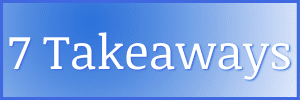The sounds of friendship. Listening. Manipulating beliefs. No such thing as perfection. Good info versus info overload. What the world owes you. Becoming remarkable.

If you’re having difficulty viewing this email, visit 7takeaways.com/latest.
If a link to a source below leads to you a paywall read my note: Paywalls.
If someone forwarded you this email, subscribe at 7takeaways.com.
1. “Smile and Make Noises of General Approval”
What Real Friends Look Like – Mark Manson – (blog)
Manson breaks down “friendship” into five categories, ranging from vague recognition to chosen family. Just the other day I was describing to a friend one level of friendship as a “middle of the night phonecall friend”. Someone for whom you would immediately, with no question, go help after a middle of the night phonecall. Not all friendships reach that level, but the ones that do are precious.
The truth is that we need all levels of friendships in our lives to be healthy. The question is just navigating where everyone fits.
Establishing friendships at any level has become more difficult of late and has always been more difficult as we age.
Do this: Put in the effort.
Support 7 Takeaways
(Or just forward this to a friend.)
2. “It is inherently interesting to hear someone talk about what they’re interested in”
Advice From a Recovering Blowhard – Adam Savage – (YouTube: Adam Savage’s Tested)
Savage was asked a question: “how do you promote your work without being a blowhard?” It’s an interesting question, particularly because the answer applies in so many more situations than just promoting your work.
Listen. That’s it. Listen. Savage admits he has a tendency to dominate conversations and needs to do a better job listening. I feel the same way. Someone he was talking to suggested a simple rule:
Let two people talk before I contribute again.
Doesn’t apply everywhere, but it applies often.
Do this: Listen.
3. “Reminding people of their mortality increases the appeal of authoritarian ideas”
Thinking, Fast and Slow – Daniel Kahneman – (ebook/audiobook)
I’m really enjoying this book. I’d put it off for some time because of its length, so while I’m only 11% in (per Kindle), I’m finding lots of good concepts and ideas already.
The above caught my attention as part of a section on how seemingly unrelated concepts and thoughts can have a surprising impact on our beliefs.
… support for propositions to increase the funding of schools was significantly greater when the polling station was in a school than when it was in a nearby location. A separate experiment showed that exposing people to images of classrooms and school lockers also increased the tendency of participants to support a school initiative.
Perhaps that example seems obvious, but I use it because it’s clear how the concept (called “priming”) can be used to subtly influence people’s beliefs and decisions. The book includes many more examples that would make you scratch your head, including the takeaway above, which seems particularly relevant these days.
Do this: Question your beliefs and their origins.
4: “The truth is that you are not perfect, and neither is anyone else.”
You’re Not Perfect – Arthur C. Brooks – (The Atlantic)
Brooks takes issue with the frequent self-help admonition: “You’re perfect just the way you are”. I have to admit, it’s always struck me as odd, and even self-defeating and limiting.
All of this suggests a plausible pathway from our constantly praising others (especially kids) to boost their self-esteem in the short run to skyrocketing mood disorders among young adults in the long run.
It’s, of course, much more than that, but I often wonder if the participation trophies of yesterday are also in part responsible for the rise in depression across the affected generation.
Healthier, I think, is to realistically recognize one’s flaws, and take steps to address the ones we think are worth addressing. The trick, of course, is “realistically”, since psychology and society stack the deck against that kind of evaluation.
Do this: Know thyself. And grow from there.
5. “We can only take in so much information.”
Why Good Information is Gold – David Moscrop – (Blog)
The premise is very simple: in a world of information overload, it’s ever more difficult to separate the wheat from the chaff. Throw in various forms of fatigue and resistance, and consuming “good” information (for some definition of “good”) is both difficult, and exceptionally valuable.
… many of us are inclined to want to reinforce our preconceived notions or beliefs and to belong to community of believers rather than get the “right” answer and risk alienating ourselves from our own identity or group
It’s another case where truth (presumably a good thing) faces an uphill battle. Trusted sources and curation become more and more valuable over time, as we hopefully zero in on whatever turns out to be true.
Do this: Choose your information sources wisely.
6. “What do I owe the world?”
What does the world owe us? – Seth Godin – (Blog)
This (very short) blog post caught my eye mostly because I see so much entitlement these days; the expectation that we’re “owed” something by others, by life, by the world … by whatever. Something or someone owes us something.
No. That’s not how this life works. The world doesn’t owe you a darned thing. The inherent unfairness of life is perhaps the biggest clue. Those we think might deserve better (entitlement often meaning ourselves) don’t get it, and those we think don’t deserve what they have get it instead.
Right or wrong, just or not, expecting the world to deliver on anything you feel it might owe you is folly, and completely out of your control, anyway.
Do this: Ask not what the world can do for you. Ask what you can do for the world.
7. “Success Obligé”
How To Murder Your Mediocrity – Guy Kawasaki – (YouTube/TEDxSonomaCounty)
A video listicle? Visticle? Regardless, Kawasaki shares his “10 ways to make a difference and be remarkable.” It’s a worthwhile watch. The takeaway I’ve selected above, from his number 9 item, is simply this:
With success comes the obligation to help others. When you succeed, remember those who helped you along the way and keep the door open for others.
I think we all can quickly think of individuals in both categories: helpful, and not. Be one of the helpful ones. It’s really just another form of “paying it forward”.
Do this: Be remarkable.
Additional Interesting Links
- YouTube Transcript – Watch a YouTube video with the copy/paste-able full transcript displayed along side.
- There’s Something Incredible Under The North Pole – Ridges & crust.
- I Used to Run a Popular Newsletter. Then Things Started Getting Weird. – Parasocial relationships.
What I’m Reading
In progress:
- Magic Triumphs – Ilona Andrews
- Thinking, Fast and Slow – Daniel Kahneman (audio)
- Supercommunicators: How to Unlock the Secret Language of Connection – Charles Duhigg
- The Problems Of Philosophy – Bertrand Russell
- Feel-Good Productivity: How to Do More of What Matters to You – Ali Abdaal
Daily:
- A Calendar of Wisdom: Daily Thoughts to Nourish the Soul, Written and Selected from the World’s Sacred Texts – Leo Tolstoy
A full list of my common sources is on the sources page, and the books I’ve read are listed on my Reading List page.
Support 7 Takeaways
Your support helps keep 7 Takeaways viable. I appreciate your consideration VERY much. I have options for recurring Support (Monthly/Quarterly/Yearly options) as well as one-time support over in The Ask Leo! (my “day job”) store.
Another thing that really helps is sharing 7 Takeaways with a friend. Just forward this email on. And if you received this email from a friend, you can subscribe at 7takeaways.com to get your own copy every Sunday.
Thanks!
-Leo

There are three little words used on this page that immediately raise my BS detector to full alert. No, not “I love you”. They are “The truth is”. That seems like some kind of priming meant to get us to drop our guidance system.
Chris.
To be clear, those are two quotes from two other pages.
Before just reacting and passing judgement on the phrase, I’d encourage you to dive deeper into what the author is saying.